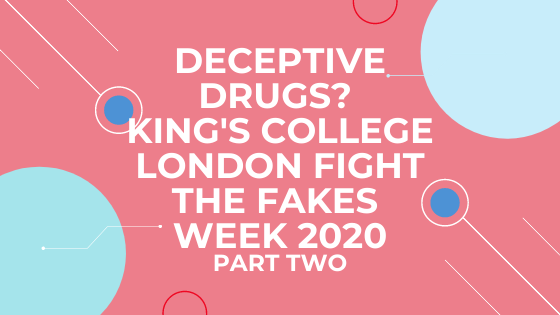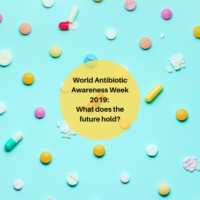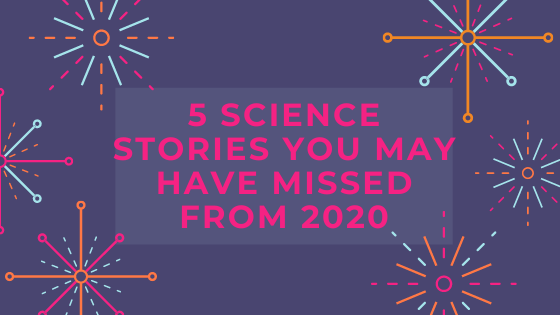Welcome back to our overview of King’s College London’s Fight the Fakes Week 2020! In part one, we introduced The Fight the Fakes Alliance and gave you the lowdown on the first three talks of the event. In this second and final instalment, we’re exploring the disproportionate impact that fake medicines are having in Africa, as well as how malaria treatment is being affected. Read on to learn more!
Fake and counterfeit drugs in Africa: Its impact on people and health systems

According to the WHO, 100,000 people die annually in Africa from taking fake medicines and approximately 40% of medicines in Africa are falsified, but local tests estimate that these numbers may be much higher.
The talk opened with the personal experience of Adebayo Alonge, who became a victim of fake drugs whilst growing up in Nigeria; he had taken Salbutamol, a drug that commonly comes in an inhaler and is used to relieve asthma and breathlessness, bought by his father from a local chemist. He fell into a deep coma and woke 21 days later to find himself in the hospital where doctors had been frantically trying to save his life and trying to understand what caused his coma. With no clues as to potential drug interactions or other effects, the pills he had taken were sent off to a lab for analysis, where their investigation uncovered that the active ingredient was actually a very high dose of diazepam, a drug used to treat anxiety, muscle spasms, and seizures. Through the chemist that sold them the drug, they were able to trace it back to a wholesaler who admitted to relabelling an about-to-expire batch of diazepam and selling it into the channel that eventually led to his father buying it from that local chemist.

The experience motivated Adebayo to become a pharmacist and become an anti-fake crusader and would eventually lead to him founding a device allowing for quick and effective identification of fake medicines. Named RxAll, it is a miniaturised benchtop spectrophotometer that analyses the quality of a drug within 20 seconds. The device also assesses the active ingredients and via machine learning technology, aggregates the data to then be shared with pharmaceutical companies, providing them with information of where falsified medicines are cropping up and giving them the knowledge they need to fight the fakes before even reaching consumers. RxAll is operational across 7 cities in Nigeria with aims to expand to 14 at the end of 2021, over 950 facilities are currently using this device and with continued expansions, it can save thousands of lives.
Next, we heard from Elizabeth Gatumia of the Kenyan Heart National Foundation who discussed the severe impact fake medicines have on people on the African continent. The Kenyan Heart Foundation focuses on raising awareness of and educating people on Rheumatic Heart Disease, a disease that starts Group A Streptococcus infection, causing strep throat or scarlet fever, which if left untreated leads to permanent damage of the heart valves. Strep throat is easily treated with the most well-known and cheapest antibiotic available today, penicillin. Unfortunately, the fake medicines crisis in Africa means that many receive substandard drugs and this easily preventable disease becomes fatal.
The Kenyan Heart National Foundation has launched many initiatives to educate people on this infection, such as visiting schools to teach children symptoms to watch out for, delivering seminars to health care professionals, and creating murals on school walls about symptoms and pathology of strep throat. When the fake medicine crisis is so wide-spread and deep-rooted these organisations have no choice but to teach young children how to identify their symptoms and what to do to reduce their chance of contracting this infection so that they do not have to seek unreliable medications that may further compromise their health.
Dr. Francis Brako explained the vicious cycle of substandard drugs in Africa. Going to the hospital to treat a simple infection could have life-threatening consequences and when almost 50% of the medicines are falsified people have lost their faith in the health care system. As a result, patients avoid visiting the doctor, making them sicker, and the ones who do seek treatment are also taking a huge risk as sub-standard medications may make them worse. Either way, people are not receiving the treatments they need, making them weaker and less productive unable to work, and therefore pushing them further into poverty. This also puts a strain on health care workers as they must spend more time rectifying the problems caused by fake medicines and thus have less time and resources to treat other patients.

Moreover, one of the biggest issues of fake medicines is drug resistance which creates a further burden on the country as drug-resistant pathogens will require newer more robust treatment. Dr. Brako highlighted the economic consequences of fake medicines; the presence of fake drugs has led to a revenue loss of up to 40% in the legitimate market. As these companies lose profits, they are unable to create more genuine drugs, which leads more people to use falsified medicines. Furthermore, fake medicines lead to loss of tax revenue to the government as falsifiers do not register drugs and evade taxes; Tanzania reported revenue losses of £600 million on tax evasion due to the fake medicines trade. Dr. Brako also highlights the security issues in Africa and how the money obtained from the sales of fake medicines goes on to fund weapons that further fuels crime and civil unrest in Africa. It’s clear that falsified drugs can lead to devastating consequences across society as a whole
Priscilla Buliga from Novartis, concluded the talk, discussing how the complexities of the local environment make it easier for fake medicines to be transported and sold in Africa. The main issue highlighted by Priscilla and others during the talk is the existence of porous borders which allows these medications to flow into the continent with ease. Weak legal enforcement and corruption allow criminals to get away Scot-free, as there are few consequences in the transport and sale of fake medicines. Moreover, fake medicines can illegally find their way into the legal supply chain through legitimate wholesalers. Priscilla reiterated many points from Dr. Bako, with the impact of fake medicines fuelling poverty and creating distrust between patients and the health care system. An interesting point Priscilla raised is that the use of fake medicines actually increases hospitals’ expenditure on drugs because these drugs do not give relief in the given time-frame and so more of these drugs are needed and creates a heavy financial and time burden on the health care systems.
To alleviate the crisis of fake medicines, industries have taken measures to educate health care workers on how to identify suspected falsified medicines on the market. Moreover, these companies have created post-market surveillance teams who are the first point of contact for suspected counterfeits. Staff are trained to identify false medications and provide training for healthcare professionals to identify and report falsified medications. Moreover, Novartis has also created hand-held spectrophotometers that work similarly to the RxAll device to identify fake medicines.
These various talks really brought to light the severe impact of fake medicines in Africa and have highlighted various methods to tackle these issues with education and communication at the heart of the discussion. Raising awareness of these problems and communicating with patients, healthcare workers, government officials, and industry professionals is key to eradicating these problems. The development of mobile spectrophotometer devices has given people the power to identify and safeguard against fake medicines. With all the various initiatives fighting the fakes at different levels in the system, it is only a matter of time until we see change.
How do we solve the issue of fake antimalarials?

Malaria is a life-threatening infectious disease that is transmitted by female mosquitoes (of the Anopheles genus) through bites. Despite a large number of antimalarial drugs now available, malaria is still the most common and deadly parasitic disease in the world. Therefore, perhaps it’s no surprise that antimalarials are also subject to forgery, and fighting fake antimalarials was the topic of Friday’s session.
In 2019, there were 229 million new malaria infections and 409,000 deaths from malaria worldwide. However, it is not just the disease that is threatening lives, it is estimated that 450,000 global deaths could be attributed either directly or indirectly to falsified or substandard antimalarials, with most of these occurring in children under five years old. Antimalarials are amongst the most widely falsified drugs and it is estimated that in malaria-prone countries, up to two-thirds of antimalarials are falsified or substandard, for example, in Ghana and Nigeria, 40% and 64% of antimalarials are fake, respectively.
Check out our coverage of the ‘Malaria in Africa: What’s Next? event from 2019 to learn more about the disease and efforts to combat it
The COVID-19 pandemic has added another element of difficulty to the global task of tackling malaria. Even moderate disruptions to supply chains can massively affect the availability of genuine antimalarial drugs, providing opportunities for sellers of fake drugs to trade. The WHO claims that a 25% disruption to the antimalarial drug supply in Africa could lead to an additional 46,000 deaths annually.
Decreased security in supply chains provides opportunities for criminals to take advantage of and sell fake medicines. Also puts pressure on supply chains due to the strain on pharmaceutical ingredients, ramp up production of different ingredients needed for medicines, that pressure creates a shortage in antimalarials in 20202, creates an opportunity for medical traffickers to increase in falsified ones available instead.
Keep up to date on the latest COVID-19 news in our ‘COVID Corner’

To combat malaria, we need to reduce the number of infected patients so that transmission stops. To do this, patients must be treated correctly with proper antimalarials. However, if these patients are taking fake medicines, this will be impossible to achieve. The way to tackle this issue, is, as we have learnt throughout this week; education. Raising awareness about the availability of fake drugs and teaching people how to identify false and genuine medicines is crucial. There are also opportunities for advances in technology to help the fight; handheld devices that use infrared spectroscopy to detect falsified antimalarials, as well as ‘scratch and SMS’ technology, where a panel on the drug packet is scratched off to reveal a code which can identify whether the medicine is genuine or not.
Collaboration between local and international authorities is needed to fight fake antimalarials, and in turn, fight malaria itself. Malaria tends to hit the poorest and most vulnerable in society the hardest, and they are now also being threatened by the risks of falsified and dangerous medicines. If we are going to eradicate malaria, we must also make a global effort to tackle the threat of fake antimalarials.
We hope you’ve enjoyed reading our highlights from the week, and are now armed to spot and avoid fake medicines! Please help to raise awareness by sharing this article, and be sure to follow King’s Fight the Fakes on Twitter and Instagram too!
Don’t forget, you can watch recordings from all of the Fight The Fakes week talks on YouTube!




